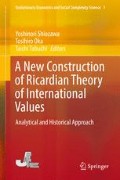Abstract
Ricardo’s (On the principles of political economy, and taxation, 1817) theory of comparative advantage is the first rigorous theory that demonstrates that free trade benefits every country. He explained his theory using a numerical example of two countries and two commodities. However, the fact that the theory cannot be true when we expand his model to the multicountry and multicommodity case, or to the model that assumes intermediate goods, became clear. Following the study by Graham (Q J Econ 46:581–616, 1932) and McKenzie (Rev Econ Studies 21: 165–180, 1954), the neo-Ricardian theories of international trade as developed by Steedman (Fundamental issues in trade theory, Macmillan, London, 1979) reconsidered gains from trade and showed the possibility of losses from free trade. Recently, Shiozawa (Evol Inst Econ Rev 3: 141–187, 2007) indicated the differences in the number of countries and goods and analyzed cases in which prices did not depend on demand but were determined by production cost. This chapter surveys the development of trade theories and analyzes the gains from trade using the most generalized model. Furthermore, it also considers how the new theory of international values proposed by Shiozawa (Evol Inst Econ Rev 3: 141–187, 2007) provides a new horizon to the previous results.
Access this chapter
Tax calculation will be finalised at checkout
Purchases are for personal use only
Notes
References
Amano, A. (1966). Intermediate goods and the theory of comparative advantage: A two-country, three-commodity case. Weltwirtshaftliches Archiev, 96, 342–345.
Chipman, J. S. (1965). A survey of the theory of international trade: Part 1, the classical theory. Econometrica, 33, 132–147.
Emmanuel, A. (1973). Unequal Exchange. New Left Books.
Graham, F. D. (1932). The theory of international value. Quarterly Journal of Economics, 46, 581–616.
Jones, R. W. (1961). Comparative advantage and the theory of tariffs: A multi country model. Review of Economic Studies, 28, 161–175.
Kurz, H. D. (1978). Rent theory in a multisectoral model. Oxford Economic Papers, 30, 16–37.
McKenzie, R. W. (1954). Specialization and efficiency in world production. Review of Economic Studies, 21, 165–180.
Mill, J. S. (1852), Principles of Political Economy with Some Applications to Social Philosophy, Third Edition, London. The Collected Works of John Stuart Mill, Volume II – The Principles of Political Economy with Some of Their Applications to Social Philosophy (Books I-II), ed. John M. Robson, introduction by V. W. Bladen (Toronto: University of Toronto Press, London: Routledge and Kegan Paul, 1965).
Mirrlees, J. A. (1969). The dynamic non-substitution theorem. Review of Economic Studies, 36, 67–76.
Montani, G. (1975). Scarce natural resources and income distribution. Metroeconomica, 27, 68–101.
Negishi, T. (1981). Classical economics and modern economics. Iwanami Publishing. (in Japanese).
Negishi, T. (1983). History of economics. Toyokeizaishinposha. (in Japanese)
Nikaido, H. (1961). Linear mathematics for economics. Baifukan. (in Japanese)
Ricardo, D. (1817), On the Principles of Political Economy, and Taxation.
Samuelson, P. A. (1975). Trade pattern reversals in time-phased Ricardian systems and international efficiency. Journal of International Economics, 5, 309–363.
Shiozawa, Y. (2007). A new construction of Ricardian trade theory a many-country, many-commodity case with intermediate goods and choice of production techniques. Evolutionary and Institutional Economics Review, 3, 141–187.
Smith, M. A. M. (1979). Intertemporal gains from trade. Journal of International Economics, 9, 239–248.
Steedman, I. (1979). Fundamental issues in trade theory. London: Macmillan.
Steedman, I. & J.S. Metcalfe (1973), On foreign trade, Economia Internazionale, pp. 516–528, reprinted in Steedman (1979).
Takamasu, A. (1983). Neo-Ricardian rent theory. Keizai Ronso, 132, 119–140. (in Japanese)
Takamasu, A. (1986). Production possibility frontier in a Sraffa-Leontief economy. The Manchester School, 59, 202–207.
Takamasu, A. (1991). Neo-Ricardian trade theory. Sobunsha. (in Japanese)
Author information
Authors and Affiliations
Corresponding author
Editor information
Editors and Affiliations
Rights and permissions
Copyright information
© 2017 Springer Science+Business Media Singapore
About this chapter
Cite this chapter
Takamasu, A. (2017). The Neo-Ricardian Trade Theory and the New Theory of International Values. In: Shiozawa, Y., Oka, T., Tabuchi, T. (eds) A New Construction of Ricardian Theory of International Values. Evolutionary Economics and Social Complexity Science, vol 7. Springer, Singapore. https://doi.org/10.1007/978-981-10-0191-8_5
Download citation
DOI: https://doi.org/10.1007/978-981-10-0191-8_5
Published:
Publisher Name: Springer, Singapore
Print ISBN: 978-981-10-0190-1
Online ISBN: 978-981-10-0191-8
eBook Packages: Economics and FinanceEconomics and Finance (R0)

